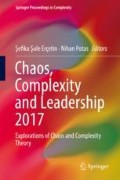Abstract
The goal of this study is to evaluate school administrators’ views toward social media networks in the light of chaos and complexity theories. In this research, case studies, that is, qualitative research design, were used to assess the level of school administrators’ use of social media. The participants of this study consist of 12 secondary school administrators selected by criterion sampling that being one of the purposeful sampling methods. The semi-structured interview form developed by the researcher was used in the data collection process. In this paper, data were analyzed using content analysis method. The paper concludes that school administrators interact with teachers, students, and stakeholders using social media and that a complex network of relationships is emerging. This complex network of relationships can lead to chaotic situations in school administration if not well administrated.
Access this chapter
Tax calculation will be finalised at checkout
Purchases are for personal use only
References
Alican, C., & Saban, A. (2013). The attitudes of the students attending secondary school and high school on the use of social media: Ürgup example. Journal of Social Sciences Institute, 35(2), 1–14.
Boyd, D. M. (2008). American Teen Sociality in Networked Publics. (doctoral thesis). California: Berkeley University.
Burden, K. J. (2010). Conceptualising teachers’ professional learning with web 2.0. Campus Wide Information Systems, 27(3), 148–161. https://doi.org/10.1108/10650741011054456.
Bülbül, S., & Erçetin, E. (2010). Chaos and the analogy of education. Middle East Journal of Scientific Research, 5(4), 280–282. [online] http://www.idosi.org/mejsr/mejsr5 (4)/14.pdf.
Cohen, L., Manion, L., & Morrison, K. (2007). Research methods in education (8th ed.). London/New York: Routledge.
Cox, D., & McLeod, S. (2014a). Social media strategies for school principals. NASSP Bulletin, 98 (1), 5–25.
Cox, D., & McLeod, S. (2014b). Social media marketing and communications strategies for school superintendents. Journal of Educational Administration, 52(6), 850–868.
Creswell, J. W. (2012). Educational research: Planning, conducting, and evaluating quantitative and qualitative research (4th ed.). New York: Pearson Education.
Dabbagh, N., & Kitsantas, A. (2012). Personal learning environments, social media, and self-regulated learning: A natural formula for connecting formal and informal learning. The Internet and Higher Education, 15(1), 3–8. https://doi.org/10.1016/j.iheduc.2011.06.002.
Ellensburg, W., Island, S. R. H. H., & Head, H. (2012). Perceptions of Social Media in Education by Pre-Service Administrators and Pre-Service Teachers. 58th Annual Conference Education Law Association, South Carolina.
Erçetin, Ş. Ş., & İli, K. (2012). The effect of social media addiction on students lives. Humanity & Social Sciences Journal, 7(2), 110–113.
Fang, J., Wen, C., & Prybutok, V. (2014). An assessment of equivalence between paper and social media surveys: The role of social desirability and satisficing. Computers in Human Behavior, 30, 335–343.
Giunchiglia, F., Zeni, M., Gobbi, E., Bignotti, E., & Bison, I. (2017). Mobile social media and academic performance. In International conference on social informatics (pp. 3–13). Cham: Springer.
Jones, N., Blackey, H., Fitzgibbon, K., & Chew, E. (2010). Get out of myspace! Computers & Education, 54, 776–782.
Kaplan, A. M., & Haenlein, M. (2011). The early bird catches the news: Nine things you should know about micro- blogging. Business Horizons, 54(2), 105–113.
Menteşe, M. (2013). Teacher and manager views on the use of social media media and tools in education. Unpublished master’s thesis, Hacettepe University, Ankara.
Muijs, D., West, M., ve Ainscow, M. (2010). Why network? theoretical perspectives on networking. School Effectiveness and School Improvement
Nidiffer, P. M. (2010). Tinkering with restrictions on educator speech: Can school boards restrict what educators say on social networking sites? University of Dayton Law Review, https://litigatioessentials.lexisnexis.com/webcd/app?action=DocumentDisplay&crawlid=1&doctype=cite&docid=36+Dayton+L.+Rev.+115&srctype=smi&srcid=3B15&key=92b 7aeab2211edea77bfaa8c31047902 .
Papandrea, M. R. (2011). Social media, public school, teachers, and the first amendment. NCL Rev., 90, 1597.
Toğay, A., Akdur, T. E., Yetişken, İ. C., & Bilici, A. (2013). The use of social networks in educational processes: A MYO experience. XIV. Academic Informatics Conference,28–30.
Vural, Z. B., & Bat, M. (2010). Social media as a new communication environment: A survey of the faculty of communication at the Aegean university. Journal of Yasar University, 20(5), 3348–3382.
Wang, Y. (2013). Social media in schools: A treasure trove or hot potato? Journal of Cases in Educational Leadership, 16(1), 56–64.
Williamson, R., & Johnston, H. (2013). The school leader's guide to social media. New York: Routledge.
Yıdırım, A., & Şimşek, H. (2013). Qualitative research methods in the social sciences. Ankara: Seçkin Publishing.
Yin, R. K. (2002). Case study research: Design and methods. In Applied Social Research (3th ed.). London: Sage Publications.
Author information
Authors and Affiliations
Corresponding author
Editor information
Editors and Affiliations
Rights and permissions
Copyright information
© 2019 Springer International Publishing AG, part of Springer Nature
About this paper
Cite this paper
Yalçın, M.S. (2019). Assessment of School Administrators’ Views Toward Social Media. In: Erçetin, Ş., Potas, N. (eds) Chaos, Complexity and Leadership 2017. ICCLS 2017. Springer Proceedings in Complexity. Springer, Cham. https://doi.org/10.1007/978-3-319-89875-9_30
Download citation
DOI: https://doi.org/10.1007/978-3-319-89875-9_30
Published:
Publisher Name: Springer, Cham
Print ISBN: 978-3-319-89874-2
Online ISBN: 978-3-319-89875-9
eBook Packages: Social SciencesSocial Sciences (R0)

